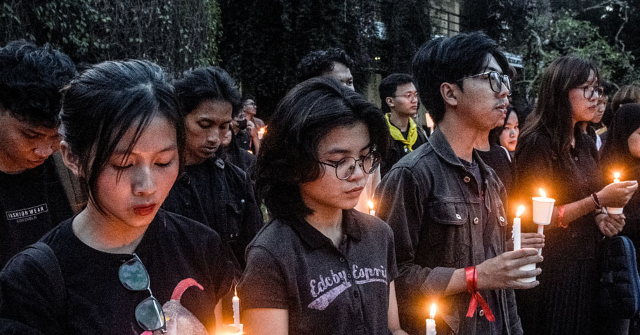Student groups in Indonesia complained of a “brutal attack” by police against two universities in Bandung on Monday, where students were demonstrating against government corruption as part of a growing nationwide movement.
The protests began outside the parliament building in Indonesia’s capital city of Jakarta on August 25. The protesters were angered by reports of a $3,000 monthly housing allowance for lawmakers.
This seemed like an extravagant perk to impoverished Indonesian citizens, whose average monthly salary is less than $800. Even in Jakarta, where wages tend to be a little higher than the rest of the country, the housing bonus for lawmakers was nearly ten times the monthly minimum wage.
The escalating cost of living caused a good deal of public unrest before mass demonstrations broke out, and the annual budget unveiled last month included deep funding cuts for regional programs, which prompted local officials to make up the difference by imposing some very unpopular tax increases.
The protests turned violent almost immediately, and the police response was severe. On the first day of the movement, demonstrators set fire to government buildings and looted the homes of several members of parliament — as well as the home of Indonesia’s finance minister, Sri Mulyani Indrawati, who appears to have been targeted because of a deepfake video that showed her making disparaging remarks about school teachers.
The protest movement exploded into a nationwide phenomenon after a 21-year-old motorcycle taxi driver named Affan Kurniawan was run over and killed by a police tactical vehicle during a protest in Jakarta on August 28. Kurniawan’s death became a symbol of what the protesters saw as the cold indifference of their government to the plight of average people, and the late rideshare driver quickly became an icon to student demonstrators.
President Prabowo Subianto, a former general elected in May 2024, ordered a strict police response to the demonstrations. Prabowo saw the protest movement as a challenge to his authority and a threat to Indonesia’s stability. He was also concerned about the mounting costs of damage from vandalism, which has been estimated at millions of dollars in Jakarta alone.
Last weekend, Prabowo said that while “the rights to peaceful assembly should be respected and protected,” he saw “signs of actions outside the law, even against the law, even leaning toward treason and terrorism” in the demonstrations.
Prabowo authorized the police to take harsh measures, including the use of blackouts, tear gas, and rubber bullets to break up protests that seemed to be getting out of hand.
The death toll as of Sunday had risen to six, including another 21-year-old killed after demonstrators in the city of Yogyakarta began throwing rocks at riot police. A human rights group called the Commission for the Disappeared and Victims of Violence claimed on Tuesday that “20 missing persons remain unfound” after crackdowns in Jakarta and several other cities.
The Indonesian president moderated his tone on Sunday, canceling a high-profile trip to China and convening an emergency meeting of religious and political leaders to address the crisis. Indonesia is the world’s largest Muslim-majority nation, although the government also recognizes Christianity, Hinduism, Buddhism, and Confucianism.
Although he repeated his warning that “anarchic” demonstrations and “attempts to destabilize the country” would not be tolerated, Prabowo announced that some of the perks for lawmakers that sparked the protests would be rescinded or limited, including the controversial housing allowance.
Large protests still took place at the Islamic University of Bandung (UNISBA) and Pasundan University on Monday night, and the police cracked down hard, using tear gas and rubber bullets in close proximity to schools for the first time during the current protest movement.
Police officials insisted they did not enter either campus, and only used nonlethal weapons because crowds of “non-student protesters” had assembled around the schools.
Student groups rejected these explanations, insisting their members were “brutally attacked” for criticizing government policies. Some of the non-student demonstrators who gathered near the universities claimed they were only on the scene to protect the students and offer medical services if needed.
“We feel campuses are no longer safe for students,” said Raviv Tuanku Alsaid, head of the Islamic Students Union at UNISBA. “When military or security officers came into our campuses, then there is no longer a safe zone for us.”
Labor groups have joined the protest movement, taking the opportunity to vent their own grievances against “inequality” and make their own demands for higher wages and trade protections. A manifesto for the movement, published on social media under the hashtag “#ResetIndonesia,” had grown to include 25 different demands by Monday.
Read the full article here


